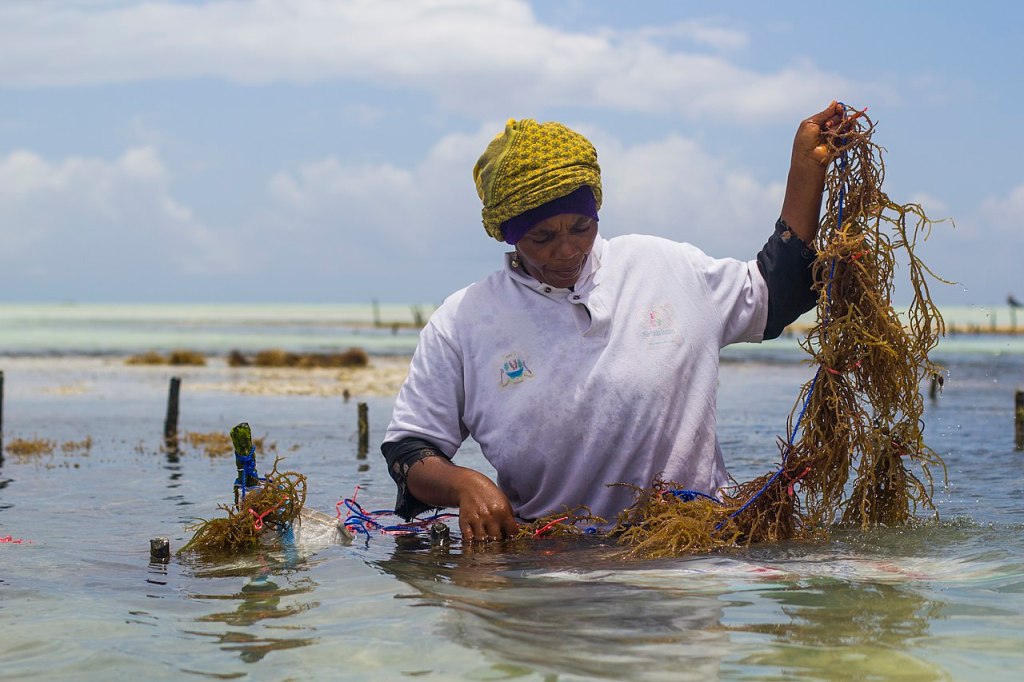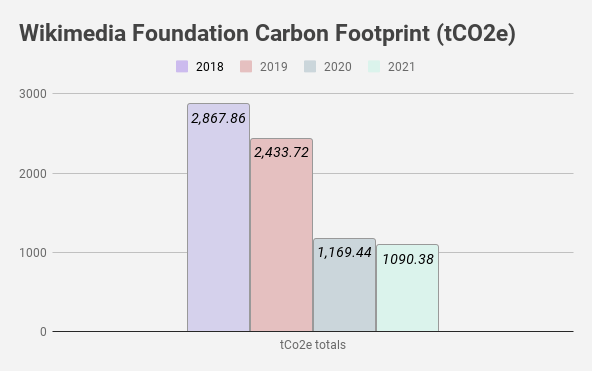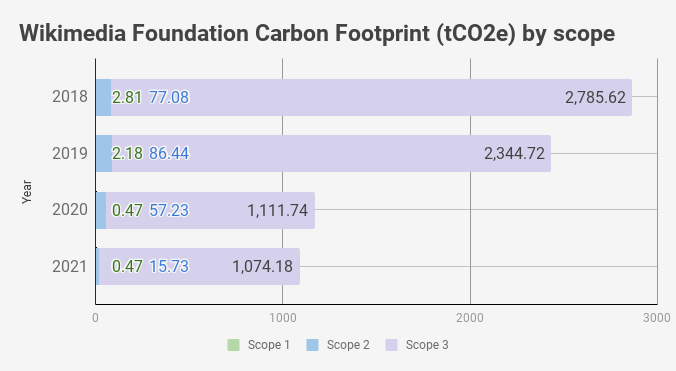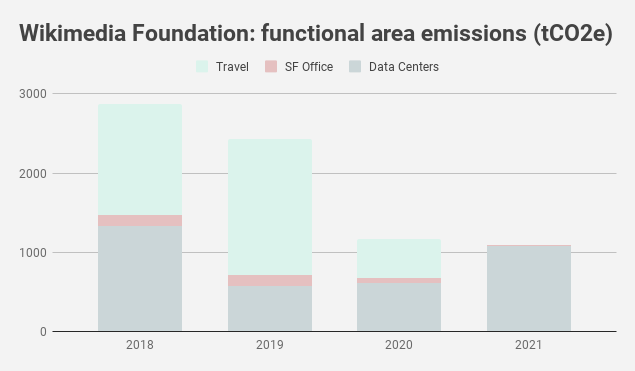
The Wikimedia Foundation continues its effort to ensure that our work and mission support are in step with a more sustainable world. We recently published our annual environmental sustainability (carbon footprint) report that covers calendar year 2021, while also looking forward to our efforts in 2022 and beyond. This report is part of an ongoing annual series of carbon footprint reports and renews our commitment to be conscious of our overall environmental impact while we work to make free knowledge available to every human being.
The details of our environmental sustainability carbon footprint report can be found on Wikimedia Commons, which holds much of the media used on Wikipedia and its sister projects. A summary of the report is below.
• • •
The Wikimedia Foundation’s overall carbon emissions continue to be at a lower level than previous years due to the COVID-19 global pandemic and associated business travel restrictions. Our overall emissions decreased by 7% in 2021 – a smaller decline than expected but reflects updates to our calculation methodology, particularly as it relates to our data center emissions.
Our overall carbon footprint for calendar year 2021 was approximately 1,090 metric tons CO2-equivalent (mtCO2e):
- 0.47 mtCO2e is attributed to the natural gas and refrigerants used in the San Francisco office: scope 1 emissions
- 15.7 mtCO2e is attributed to the electricity and steam used in the San Francisco office: scope 2 emissions
- 1,074 mtCO2e was due to electricity usage in our data centers and the San Francisco office: scope 3 emissions
- A negligible amount of our overall emissions were associated with travel and commuting
Key updates to our methodology
We have reallocated our data center electricity emissions from scope 2 to scope 3 category, based on guidance outlined in the GHG Protocol (using the category 8: upstream leased assets definition). The electricity used by our servers is procured by our vendors and is included in their greenhouse gas inventory as scope 2 emissions.
- By moving these emissions to the scope 3 category, we will correct previous double counting of these numbers in earlier reports.
Electricity use by the San Francisco server room has been folded into overall office electricity consumption. Because the electricity used by the San Francisco office’s server room is directly related to office operations and does not support the running of our sites, we have reassigned the Foundation’s San Francisco office server room emissions from the Data Center functional category to the Office functional category.
Exclusion of data center water usage. Due to challenges related to data collection and the relatively insignificant impact that data center water use has on our overall carbon footprint, we have decided to exclude emissions related to data center water management from our reporting going forward.
- Several of our data centers already use water-free cooling or operate on closed-loop systems and recently, the codfw data center site in Carrollton, Texas upgraded to water-free cooling.
Impacts in 2021
Overall travel was significantly reduced as several large attendance annual events were held virtually and business travel was restricted to essential purposes only.
New caching servers were added in France to better serve our African, Middle Eastern, and Asian audiences. This new location utilizes a river water cooling system and has a designed Power usage effectiveness (PUE) of 1.23.
A special discussion with Louise Mabulo, hosted by the Foundation, focused on sustainable agriculture, local food production, climate change mitigation, and the relationship to broader information ecosystems; an associated editathon was also held.
Earth Day editathon was held for Foundation staff and contractors, in their volunteer capacities, as part of our third annual Earth Day celebration.
The #WikiForHumanRights 2021 campaign Right to a Healthy Environment drew 300+ participants at 34+ community events, working on 2,000+ articles in 30+ languages to encourage the expansion of Wikipedia’s climate change content.
Approximately 324 million annual page views were recorded on Wikipedia across 26,000 articles explicitly about climate change in 2021, with billions more page views on other climate-related topics.
Looking forward – 2022 and beyond
The Wikimedia Foundation has decided to discontinue direct acceptance of cryptocurrency as a means of donating. We began our direct acceptance of cryptocurrency in 2014 based on requests from our volunteers and donor communities. We are making this decision based on recent feedback from those same communities. Specifically, we will be closing our Bitpay account, which will remove our ability to directly accept cryptocurrency as a method of donating.
Travel restrictions have eased and new guidance is in place on how we travel. In 2022, the Wikimedia Foundation All Hands annual event will be held virtually, and the community event Wikimania will be a primarily virtual event with support for local gatherings where possible.
Beginning in fiscal year 2023 (July 2022 – June 2023), we will charge ourselves an internal carbon fee, per metric ton of carbon equivalent, calculated for the Foundation’s scope 1, 2, and 3 carbon emissions. We will direct these funds to support community-led initiatives focused on knowledge gaps and “topics for impact” in the environmental sustainability and sustainable development space. This is an experimental effort and more details will be released soon.
For more information about the Wikimedia Foundation’s sustainability efforts, please visit our sustainability page; you can also ask us a question on the discussion page at meta.wikimedia.org/wiki/Talk:Sustainability.
[Editor’s note: This updated article restates information related to cryptocurrency as a means of donation and a new internal carbon fee.]

Can you help us translate this article?
In order for this article to reach as many people as possible we would like your help. Can you translate this article to get the message out?
Start translation


